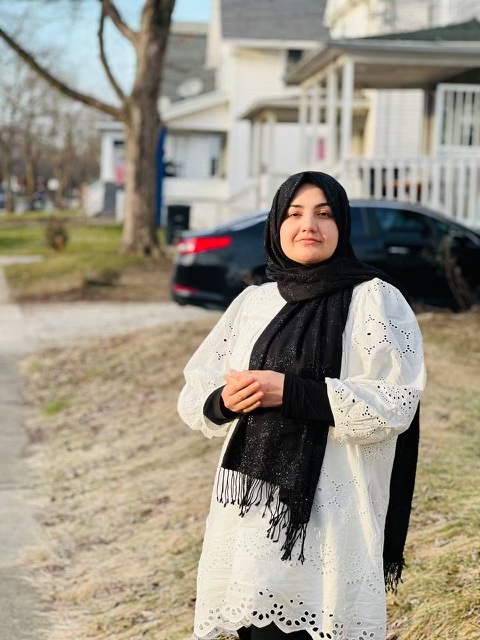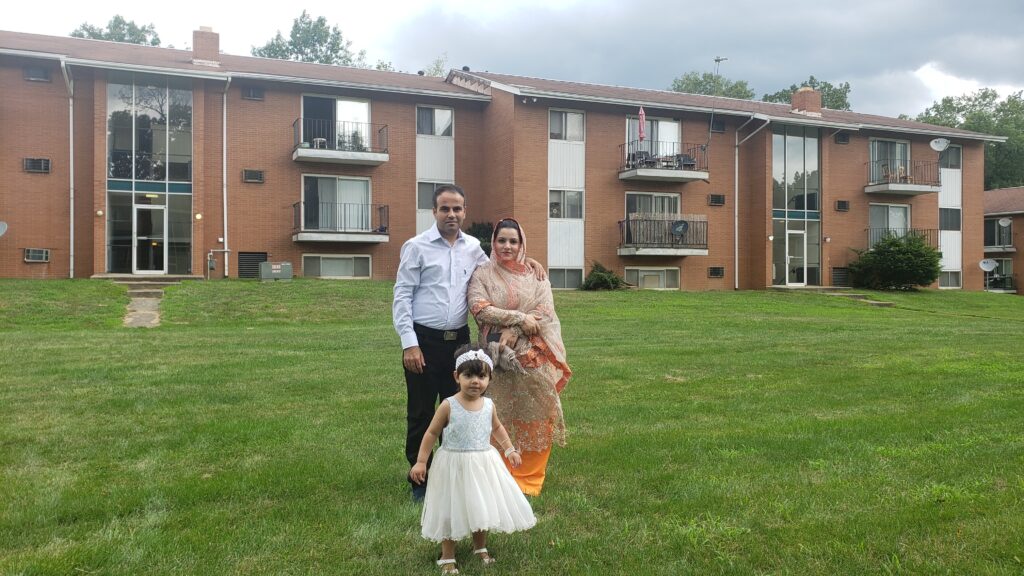By Catie Pusateri

Every year on March 21, Tamana Ziar and her extended family gather to celebrate Nowruz, the Persian New Year. They meet in Paghman, a town just outside Afghanistan’s capital city of Kabul, for picnics and games to celebrate the coming of spring.
Her family members would play soccer together, and her parents even join in volleyball games. Ziar and her sister had bicycles that they would ride, soaking up the sun and each other’s company. These are Ziar’s best memories of her life in Afghanistan: surrounded by her family.
This year, however, Ziar was a world away in the United States, unable to celebrate Nowruz with her extended family. Her sister with whom she once cycled remains in Afghanistan, where the Taliban canceled Nowruz celebrations.
Ziar and most of her family received their Special Immigrant Visas (SIVs) in 2021 to resettle in the United States after six years of waiting. Ziar, her parents and her three younger siblings arrived in the U.S. on July 27, 2021, just weeks before their home country of Afghanistan fell to the Taliban.
The Taliban, an Islamic fundamentalist group, officially took control of Afghanistan on Aug. 15 after invading Kabul.
In the months prior, the group gradually seized territory after U.S. troops pulled out of the country.
When the Taliban first came to power in 1996, they imposed their interpretation of Sharia, or Islamic law, on Afghanistan. Women were forced to don burkas, a garment concealing one’s entire body, and men had to grow beards. Women were banned from working, getting an education and walking in public without a male relative.
After the 9/11 terrorist attacks in 2001, the U.S. invaded Afghanistan and ended the Taliban’s regime. However, they never went away. Women and girls were able to make advances in their education and livelihoods in the years after Taliban rule, but targeted attacks on girls schools demonstrated a persistent hatred towards female education and independence.
Reminiscent of their repressive rule in the 1990s, the Taliban has reinforced restrictions on Afghan women and girls despite a vow to respect women’s rights. Many women are now banned from leaving the home without a male guardian. Girls over the age of 12 are not allowed to attend school. Universities now enforce gender-segregated classrooms.
Despite significant progress made in the realm of women’s rights prior to the Taliban’s takeover, Afghan women again face discrimination and the dismissal of their human rights. As the Taliban destroys any progress made in Afghanistan in recent years, those who fled the country can look forward to a future without the oversight of a repressive regime. For female Afghan refugees in particular, the United States guarantees basic freedoms now unheard of in Afghanistan.
A political science degree amid Afghanistan’s stigma
Ziar, a 23-year-old Afghan refugee newly resettled in Akron, Ohio, studied international relations and political science at Kabul University. She now works as a Community Support Specialist at the International Institute of Akron where she assists incoming Afghan refugees and interprets for them in two languages, Pashto and Dari.
With Ziar’s father encouraging her education, she pursued political science despite stigmas in Afghanistan surrounding women in politics and barriers to women’s higher education. Ziar said women are expected to become teachers or doctors, and diverting from those paths elicited judgment.
“It is so hard to find a job in a political party in Afghanistan because you’re a woman, and then you don’t have any connections in there,” Ziar said. “When I was there it was like that, but now, it’s the Taliban regime. They will never accept women in political parties and they have a lot of limitations. There was limitations, but not as much as now it is.”
In the weeks leading up to the collapse of Afghanistan, Ziar said her and her classmates feared what would happen if the Taliban regained control of the country. They were in Kabul watching surrounding cities fall to the Taliban often without a fight. As a political science student, Ziar said she could not turn away from the news as she had to study and analyze it.
“When [war] is coming to your own country, it’s very hard for you.”
Tamana Ziar
Ziar’s family had to leave her two older siblings in Afghanistan because she said they aged out of the SIV program her father applied for six years ago. Her family has been working to bring them here to the U.S., but they have been unable to obtain visas for them.
Though leaving her homeland and family members hurt her, Ziar said she felt excited about resettling in a new country and gaining new experiences. Ever passionate about expanding her skills, Ziar’s excitement predominantly lay in the new possibilities surrounding her education.
“The most important thing that I’m very happy about is the educational system here,” Ziar said. “So I’m happy that I’m here, that I can improve my skills, my education through a good university, like top universities, here and then catch other great experiences for my future.”
Afghanistan has a 5% higher education gross enrolment rate, which is one of the lowest in the world, and women make up only 1% of that enrollment rate. Ziar’s access to higher education places her in that small group, but many women and girls do not have access to basic education as a result of the current Taliban rule.
Once Ziar’s transcripts from Kabul University arrive, she plans to pursue a degree here in the U.S. and continue her education within the political science field. Ziar also advocates for women in Afghanistan as a member of Her Afghanistan, an organization founded in 2012 to support Afghan women.
Even as education and women’s rights expanded in Afghanistan before the Taliban’s takeover, access to quality education and equal rights remained largely limited for women. In 2018, 3.8 million Afghan girls were enrolled in schools compared to the 5,000 girls enrolled in 2001. However, UNESCO reported that the female literacy rate in Afghanistan stood at 30% in 2018 which was an increase from 17% in 2011, but still low when compared to other nations.
Her first job, her first car and her first taste of freedom

Thirty-year-old Afghan refugee Zahida Baryalai left school in ninth grade and never worked outside the home. When she arrived in the U.S. in 2019 with her husband, Fazal, and their two children, she now had more opportunities for independence.
On a Friday afternoon, I called Fazal and Zahida for our interview. Fazal invited Zahida into the room, and she said a quick and quiet hello to me. She cannot speak much English, so Fazal interpreted for her. After I asked a question, Fazal translated it to Zahida and I listened to her soft-spoken voice as she shared her story.
Fazal translated Zahida’s words, and I was able to hear her story as a woman who now enjoys a level of independence that was unavailable to her in Afghanistan. Zahida recently started working as a warehouse associate at Amazon — her first job in her life. Through Fazal’s translation, Zahida said she is happy here in the U.S. because she “feels like she is standing on her own feet.”
She makes her own money, drives her own car, buys her own groceries and travels freely and unaccompanied. Zahida’s sisters and friends back in Afghanistan are surprised at how progressive her life in the U.S. is, Fazal said. The freedom of women is what Zahida loves most about the U.S., followed by the sense of security that their home in Akron provides.
During the interview, their 3-year-old daughter played with her toys around them. Her toys played music and spoke to her, which made Fazal lightly chuckle. Both Zahida and Fazal expressed how happy they are that their children will be able to have an education here since there are not as many resources available in Afghanistan.
“The education system is a lot better than in Afghanistan. Unfortunately, most of the children in Afghanistan have no access to even their textbooks. They have not enough food, they have not enough teachers. And you might have seen some of the pictures of the schools in Afghanistan because it’s unfortunately a very poor and war-torn country. We are happy for their future. We feel that they are lucky to be in the United States.”
Fazal Baryalai
When the Baryalai family first arrived in Akron, the International Institute of Akron helped them resettle by finding them a house and securing a job for Fazal. However, Fazal said the house the Institute rented for them had cockroaches as well as broken windows and doors. They spent one night at that house and he said Zahida cried over the house’s condition, asking Fazal: “Why did we come here? What kind of situation is this?”
Their family was able to move into a more suitable house, but Fazal said he believes the International Institute of Akron has not done enough to support incoming refugees and set them up for success.
Fazal said many Akron Afghan refugees like himself make an effort to welcome newly resettled refugees and assist them in their resettlement process. Upon arriving in Akron, Ziar said she felt at home because of the strong Afghan community, and commented that it was much warmer than she expected.
“I was feeling like I’m in our own Afghan community and they had a lot of hospitality to us,” Ziar said, “and they had a lot of, like, they were always taking care of us too, we don’t have to feel alone here.”
